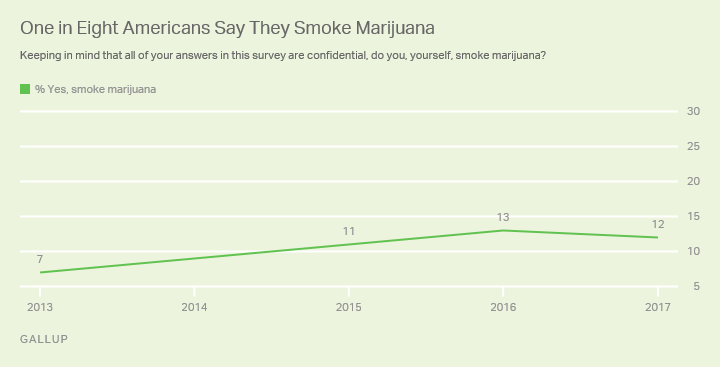http://www.gallup.com/poll/214250/say-tried-marijuana.aspx?utm_source=alert&utm_medium=email&utm_content=morelink&utm_campaign=syndication
by Art Swift
- Percentage of those who have tried marijuana highest since 1969
- One in eight currently smoke marijuana
- Younger, lower-income men more likely to smoke pot
WASHINGTON, D.C. — As more U.S. states legalize marijuana use, 45% of Americans say they have tried marijuana at least once, a new high in Gallup’s trend since 1969.

These results are from Gallup’s July 5-9 poll on Americans’ consumption habits.
When Gallup first asked this question in 1969, only 4% said they had tried marijuana. The rise in use over the past five decades has paralleled the increasing support for legalization — last year, 60% said pot should be legal, a record high. Eight states allow recreational marijuana use, and these states comprise one-fifth of the U.S. population.
The increase in the percentage who have tried pot comes amid a possible federal crackdown on legal marijuana. Attorney General Jeff Sessions has initiated a task force studying links between violent crime and marijuana, and this body will reportedly release its findings by the end of July. The attorney general also has asked congressional leaders to undo restrictions on prosecuting medical marijuana providers, citing a “historic drug epidemic.”
Fewer Currently Smoke Marijuana Than Have Tried It
A separate question finds 12% of Americans saying they currently smoke marijuana, far less than those who say they have tried the drug. The percentage saying they smoke marijuana has nearly doubled since Gallup first asked this question in 2013, although there has been no meaningful increase over the past three years.

Young adults, men and those with household incomes of less than $30,000 per year are most likely to say they currently smoke marijuana. Thirteen percent of men say they smoke pot, compared with 7% of women. Eighteen percent of those aged 18 to 29 and 13% in the lowest income bracket say they currently smoke marijuana.
| Have tried marijuana | Smoke marijuana | |||||||||||||||||||||||||||||||||||||||||||||||||||||||||||||||||||||||||||||||||||||||||||||||||||
|---|---|---|---|---|---|---|---|---|---|---|---|---|---|---|---|---|---|---|---|---|---|---|---|---|---|---|---|---|---|---|---|---|---|---|---|---|---|---|---|---|---|---|---|---|---|---|---|---|---|---|---|---|---|---|---|---|---|---|---|---|---|---|---|---|---|---|---|---|---|---|---|---|---|---|---|---|---|---|---|---|---|---|---|---|---|---|---|---|---|---|---|---|---|---|---|---|---|---|---|---|
| % Yes | % Yes | |||||||||||||||||||||||||||||||||||||||||||||||||||||||||||||||||||||||||||||||||||||||||||||||||||
| Gender | ||||||||||||||||||||||||||||||||||||||||||||||||||||||||||||||||||||||||||||||||||||||||||||||||||||
| Men | 48 | 13 | ||||||||||||||||||||||||||||||||||||||||||||||||||||||||||||||||||||||||||||||||||||||||||||||||||
| Women | 35 | 7 | ||||||||||||||||||||||||||||||||||||||||||||||||||||||||||||||||||||||||||||||||||||||||||||||||||
| Age | ||||||||||||||||||||||||||||||||||||||||||||||||||||||||||||||||||||||||||||||||||||||||||||||||||||
| 18-29 | 38 | 18 | ||||||||||||||||||||||||||||||||||||||||||||||||||||||||||||||||||||||||||||||||||||||||||||||||||
| 30-49 | 51 | 10 | ||||||||||||||||||||||||||||||||||||||||||||||||||||||||||||||||||||||||||||||||||||||||||||||||||
| 50-64 | 49 | 8 | ||||||||||||||||||||||||||||||||||||||||||||||||||||||||||||||||||||||||||||||||||||||||||||||||||
| 65+ | 23 | 3 | ||||||||||||||||||||||||||||||||||||||||||||||||||||||||||||||||||||||||||||||||||||||||||||||||||
| Income | ||||||||||||||||||||||||||||||||||||||||||||||||||||||||||||||||||||||||||||||||||||||||||||||||||||
| <$30,000 | 42 | 13 | ||||||||||||||||||||||||||||||||||||||||||||||||||||||||||||||||||||||||||||||||||||||||||||||||||
| $30,000-$74,999 | 42 | 10 | ||||||||||||||||||||||||||||||||||||||||||||||||||||||||||||||||||||||||||||||||||||||||||||||||||
| $75,000+ | 44 | 9 | ||||||||||||||||||||||||||||||||||||||||||||||||||||||||||||||||||||||||||||||||||||||||||||||||||
| Based on aggregated data from July 10-14, 2013; July 8-12, 2015; July 13-17, 2016; and July 5-9, 2017 | ||||||||||||||||||||||||||||||||||||||||||||||||||||||||||||||||||||||||||||||||||||||||||||||||||||
| GALLUP | ||||||||||||||||||||||||||||||||||||||||||||||||||||||||||||||||||||||||||||||||||||||||||||||||||||
Current marijuana usage trends downward the older one gets. But the age patterns differ when looking at lifetime usage. Those in the 30-to-49 age range (51%) are most likely to have tried the drug, followed closely by those aged 50 to 64 (49%). This suggests that marijuana was more popular among Generation X and baby boomers, who probably tried it when they were younger, than it is among millennials.
Comment;
Tobacco abuse is largely becoming more common among those who are socio-economically disadvantaged. Given that pot has a linkage with “amotivational syndrome”, it’s quite likely that it will be another drug common among the disadvantaged. Just because 60% of folks think it should be legal, does this mean that we should strap our country down with the burdens that widespread use of this drug is likely to bring? Alcohol abuse is also associated with financial and work-related issues. Considering that the middle class in this country is being supplanted by robotics and artificial intelligence, there is a significant decrease in the demand for unskilled labor that will only become more pronounced in the future as current trends are expected to continue. Why as a nation, should we legalize and unnecessary “ball and chain” around our collective ankles? The pre-frontal cortex is not mature and fully developed until 25-26 years of age. Cannabis has pronounced effects on this brain region that is involved in judgement and impulsivity. At least in the Netherlands there are some fairly strict regulations aimed at keeping cannabis away from the younger people. If we legalize it here, I hope we have the foresight to include legislation with similar restrictions (but am not expecting such a restriction).
- COVID UPDATE: What is the truth? - 2022-11-08
- Pathologist Speaks Out About COVID Jab Effects - 2022-07-04
- A Massive Spike in Disability is Most Likely Due to a Wave of Vaccine Injuries - 2022-06-30

